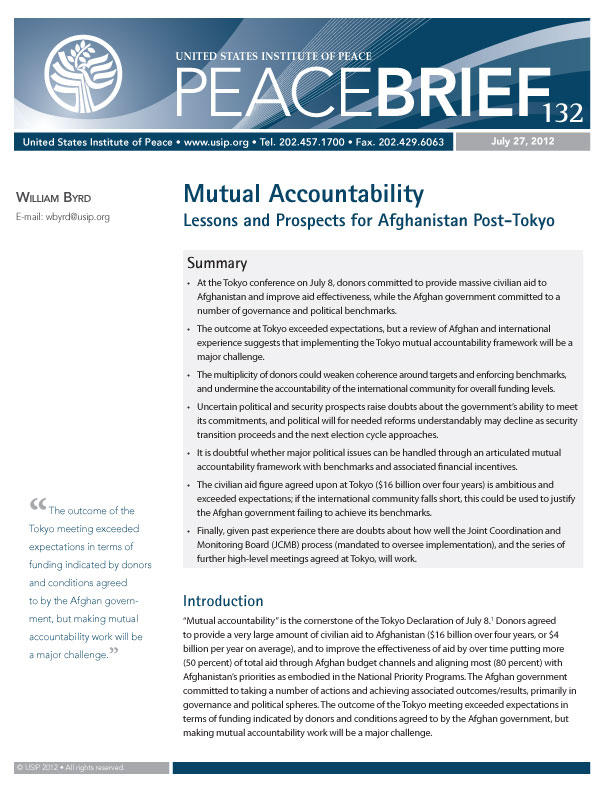Mutual Accountability
Lessons and Prospects for Afghanistan Post-Tokyo
This paper builds on remarks on mutual accountability at the July 18 U.S. Institute of Peace panel discussion “From Transition to the Transformation Decade: Afghanistan’s Economic and Governance Agenda after Tokyo” (second session on “Filling the trust gap—what does ‘mutual accountability’ mean, what are the first steps, what is the role of civil society?”). The views expressed in this brief do not necessarily reflect the views of the U.S. Institute of Peace, which does not take policy positions.

Summary
- At the Tokyo conference on July 8, donors committed to provide massive civilian aid to Afghanistan and improve aid effectiveness, while the Afghan government committed to a number of governance and political benchmarks.
- The outcome at Tokyo exceeded expectations, but a review of Afghan and international experience suggests that implementing the Tokyo mutual accountability framework will be a major challenge.
- The multiplicity of donors could weaken coherence around targets and enforcing benchmarks, and undermine the accountability of the international community for overall funding levels.
- Uncertain political and security prospects raise doubts about the government’s ability to meet its commitments, and political will for needed reforms understandably may decline as security transition proceeds and the next election cycle approaches.
- It is doubtful whether major political issues can be handled through an articulated mutual accountability framework with benchmarks and associated financial incentives.
- The civilian aid figure agreed upon at Tokyo ($16 billion over four years) is ambitious and exceeded expectations; if the international community falls short, this could be used to justify the Afghan government failing to achieve its benchmarks.
- Finally, given past experience there are doubts about how well the Joint Coordination and Monitoring Board (JCMB) process (mandated to oversee implementation), and the series of further high-level meetings agreed at Tokyo, will work.
About This Brief
William Byrd is a development economist and has worked on Afghanistan in various capacities over the past decade and longer. During 2002–2006, he was stationed in Kabul, Afghanistan, where he served as the World Bank’s country manager for Afghanistan and then as economic adviser. He is currently a visiting senior expert at the U.S. Institute of Peace.
This paper builds on his remarks on mutual accountability at the July 18 U.S. Institute of Peace panel discussion “From Transition to the Transformation Decade: Afghanistan’s Economic and Governance Agenda after Tokyo” (second session on “Filling the trust gap—what does ‘mutual accountability’ mean, what are the first steps, what is the role of civil society?”). The views expressed in this brief do not necessarily reflect the views of the U.S. Institute of Peace, which does not take policy positions.
Explore Further
- Afghanistan after Tokyo
Watch Scott Smith, deputy director of USIP Afghanistan programs, assess the two schools of thought at a July 18 event on Afghanistan's economic and governance agenda after the Tokyo Conference:



